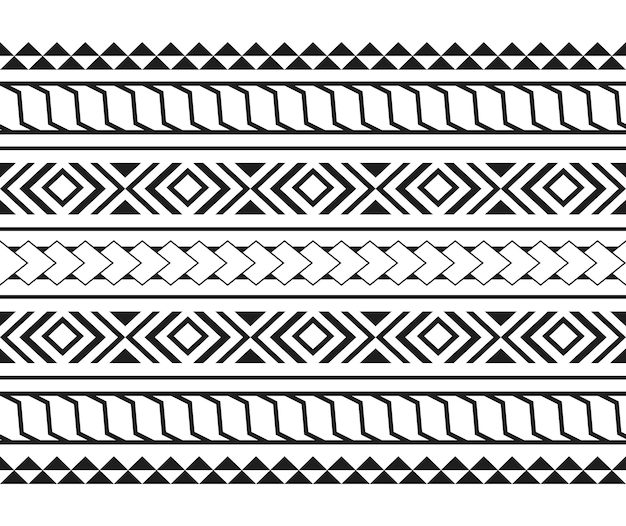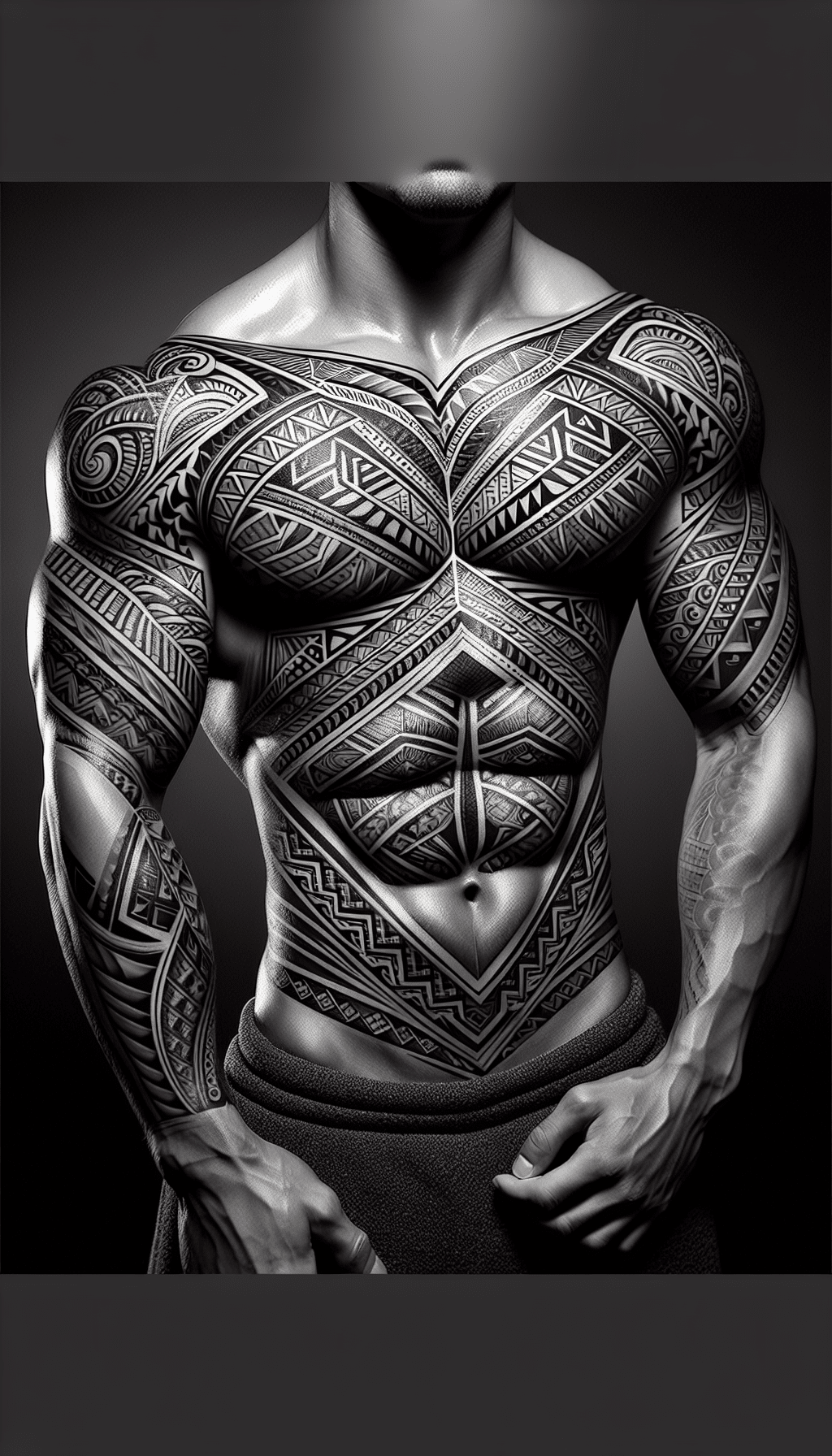The art of Polynesian tattooing is deeply rooted in cultural heritage and holds immense significance for the Polynesian people. These intricate tattoos, known for their bold lines and symbolic designs, are more than just body art; they are a visual representation of one's identity, heritage, and personal journey. Each tattoo tells a unique story, reflecting the wearer's ancestry, spiritual beliefs, and life experiences. In this comprehensive guide, we will delve into the fascinating world of Polynesian tattoo design, exploring its rich history, the meanings behind various symbols, and the cultural impact it continues to have.
The Cultural Significance of Polynesian Tattoos

Polynesian tattoos, or tā moko as they are known in the Maori language, have a long and storied history. This ancient art form originated with the indigenous people of Polynesia, a vast region encompassing over 1,000 islands in the Pacific Ocean. For Polynesians, tattoos are not merely decorative; they are an integral part of their cultural identity and a means of expressing their connection to their ancestors and the natural world.
The process of getting a Polynesian tattoo is deeply spiritual. It often involves elaborate rituals and ceremonies, with the tattoo artist, known as a tufuga, playing a vital role as a cultural guardian and spiritual guide. The tufuga is responsible for not only creating the tattoo but also ensuring that the design aligns with the wearer's life path and cultural heritage.
Symbols and Their Meanings

Polynesian tattoo designs are characterized by a unique visual language, with each symbol carrying a specific meaning. These symbols are carefully chosen to represent various aspects of life, nature, and the spiritual realm. Some common symbols and their interpretations include:
Tiki
The Tiki is perhaps the most iconic symbol in Polynesian tattoo art. It represents the first man in Maori mythology and is often associated with creation, fertility, and the divine. Tiki tattoos can symbolize strength, protection, and a connection to one’s ancestral lineage.
Turtle
The turtle, or honu, is a revered symbol in Polynesian culture. It represents longevity, wisdom, and the connection between land and sea. Turtle tattoos often signify a deep respect for nature and a desire for longevity and prosperity.
Marquesan Cross
The Marquesan Cross, also known as the Tiki Tane, is a distinctive symbol originating from the Marquesas Islands. It represents the four elements of nature: earth, water, wind, and fire. This cross-like design is often used to symbolize balance, harmony, and the interconnectedness of all things.
Fish Hooks
Fish hooks, or Moko Ora, are powerful symbols in Polynesian culture, representing prosperity, abundance, and a connection to the sea. They are often worn by fishermen and those with a deep love for the ocean. Fish hook tattoos can also symbolize a journey or a desire for spiritual guidance.
Lizard/Gecko
The lizard or gecko is a common motif in Polynesian tattoos, particularly in Samoan and Tongan designs. These reptiles symbolize agility, adaptability, and good luck. Lizard tattoos are often chosen to represent resilience and the ability to navigate life’s challenges.
| Symbol | Meaning |
|---|---|
| Tiki | Creation, fertility, ancestral connection |
| Turtle | Longevity, wisdom, land-sea connection |
| Marquesan Cross | Balance, harmony, nature's elements |
| Fish Hooks | Prosperity, abundance, spiritual guidance |
| Lizard/Gecko | Agility, adaptability, good luck |

Design Elements and Placement
Polynesian tattoo designs are renowned for their intricate patterns and bold lines. These tattoos often cover large areas of the body, with common placement sites including the arms, legs, back, and chest. The size and placement of the tattoo are carefully considered, as they can influence the overall symbolism and visual impact.
For example, tattoos on the arms are often associated with strength and protection, while back tattoos can represent a person's journey or life story. Chest tattoos, especially those featuring Tiki symbols, are believed to connect the wearer to their spiritual center and enhance their connection to the divine.
The Art of Storytelling
One of the most fascinating aspects of Polynesian tattooing is its ability to tell stories. Each tattoo is a unique narrative, with symbols and designs carefully selected to represent specific events, experiences, or beliefs. For instance, a person might choose to incorporate symbols representing their family, their occupation, or significant life milestones.
This storytelling aspect of Polynesian tattoos adds a layer of depth and personal meaning, making each tattoo a truly one-of-a-kind work of art.
The Revival and Modern Interpretations
In recent years, there has been a resurgence of interest in Polynesian tattooing, both within the Polynesian community and among people of diverse cultural backgrounds. This revival has led to a blend of traditional and modern interpretations, with artists incorporating new symbols and techniques while still honoring the rich heritage of Polynesian tattooing.
Modern Polynesian tattoos often feature a fusion of traditional symbols with contemporary designs, reflecting the wearer's unique personality and cultural influences. This blend of old and new has helped to keep the art form alive and relevant in today's world.
Preserving Cultural Integrity
With the growing popularity of Polynesian tattoos, there is a heightened awareness of the need to respect and preserve the cultural integrity of this ancient art form. Many tattoo artists and enthusiasts advocate for responsible tattooing practices, ensuring that the cultural significance of these designs is not lost or appropriated without understanding and respect.
Educating oneself about the history and symbolism of Polynesian tattoos is crucial for anyone considering this style. It ensures that the tattoo's meaning is understood and honored, fostering a deeper appreciation for Polynesian culture.
Conclusion: Embracing the Legacy

Polynesian tattoo design is a powerful expression of cultural identity, spirituality, and personal narrative. Through its intricate symbols and ancient traditions, this art form continues to captivate and inspire people from all walks of life. By understanding the meanings behind these tattoos and respecting their cultural heritage, we can embrace the rich legacy of Polynesian tattooing and honor its profound impact on modern body art.
What is the difference between Polynesian tattoos and other tattoo styles?
+Polynesian tattoos differ from other styles in their cultural significance and symbolism. While other tattoo styles may focus on aesthetics or personal expression, Polynesian tattoos are deeply rooted in ancestral heritage and spiritual beliefs, making them more than just body art.
Are Polynesian tattoos suitable for everyone?
+While Polynesian tattoos can be appreciated by people of all backgrounds, it is important to approach this style with respect and cultural awareness. Understanding the symbolism and seeking guidance from reputable tattoo artists ensures a meaningful and respectful experience.
How can I find a reputable Polynesian tattoo artist?
+Look for artists who specialize in Polynesian tattooing and have a deep understanding of its cultural significance. Check their portfolios for traditional and modern interpretations, and read reviews from previous clients to ensure a positive and culturally sensitive experience.